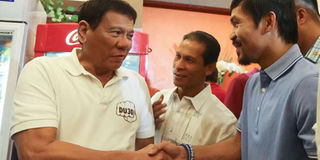Philippine leader snubs key function

Philippines' President-elect Rodrigo Duterte (left) shakes hands with boxing icon and newly elected Senator Manny Pacquiao at a meeting in Davao in southern island of Mindanao on May 28, 2017. He snubbed his proclamation as the next Philippine president on Monday. PHOTO | AFP
What you need to know:
- Mr Duterte declined to attend the nationally televised event, preferring to remain in his southern hometown of Davao.
- Mr Duterte, 71, won the elections largely due to an incendiary law-and-order platform headlined by a vow to wipe out crime within six months.
- He pledged to give security forces shoot-to-kill orders, and vowed that tens of thousands of criminals would die.
MANILA
Rodrigo Duterte snubbed his proclamation as the next Philippine president on Monday, reinforcing his image as a maverick outsider intent on challenging the nation’s political establishment.
A joint session of the House of Representatives and the Senate in Manila endorsed the official count of this month’s election, which saw the trash-talking politician who revels in threats to kill criminals win by more than six million votes.
Mr Duterte declined to attend the nationally televised event, preferring to remain more than 900 kilometres away in his southern hometown of Davao that he has ruled as mayor for most of the past two decades and he admits is his comfort zone.
“I am not attending the proclamation. I’ve never attended any proclamation (in) all my life,” Mr Duterte, who will be sworn into office on June 30, told reporters on the weekend.
WON ELECTIONS
Mr Duterte, 71, won the elections largely due to an incendiary law-and-order platform headlined by a vow to wipe out crime within six months.
He pledged to give security forces shoot-to-kill orders, and vowed that tens of thousands of criminals would die. Since the election Duterte has continued to encourage police to kill drug suspects, and said he would bring back the death penalty.
Another key message of Mr Duterte’s campaign was his pledge to take on the nation’s political and economic elite, selling himself as an explosive political outsider that could shake up a power structure overseeing one of Asia’s biggest rich-poor divides.
Mr Duterte railed against the elites and promised to fight for the poor, despite having created his own political dynasty in Davao and his own vice presidential running mate coming from one of the nation’s richest families.
Since the elections, Duterte has refused to travel to Manila and promised to remain in Davao until he assumes the presidency.
This has forced politicians, powerbrokers, business leaders and courtiers to fly to Davao for an audience. In further blows for so-called “Imperial Manila”, Mr Duterte has named many politicians from the southern Philippines to cabinet posts.
Duterte has also repeatedly expressed his disdain for spending time in Manila, describing it last week as a “dead city” overrun by slums.
He also said he planned to spend as little time as president in the capital as possible, and that he hoped to be able to fly each day to and from Davao.
Duterte’s absence at the Manila ceremony on Monday delivered a message that he would not be beholden to lawmakers, said Ramon Casiple, executive director of the Institute of Political and Economic Reforms.





